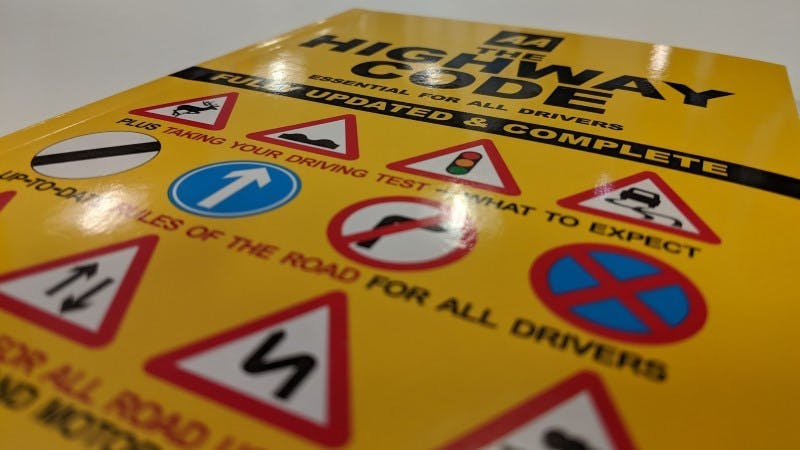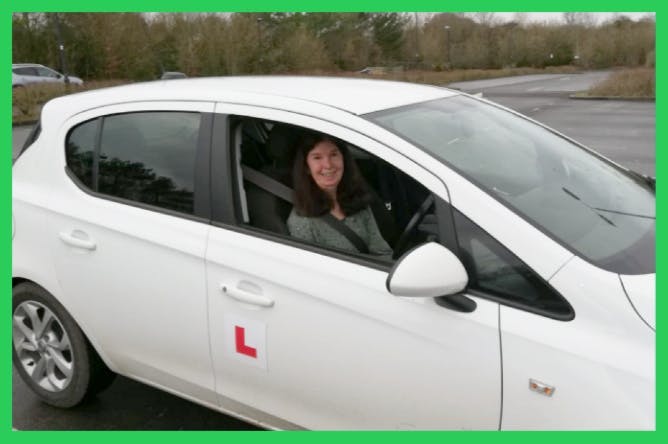
Most things are hard until you learn to do them well—and driving is no exception. The majority of people don’t pass their test on their first attempt, but most do end up passing within their first three goes. That suggests that most people find driving consistently to test standard difficult, but that it does become easier the more you work at it. Once you’ve got some mileage behind you, most people find that driving becomes almost second nature. Even as a learner, though, there are plenty of ways to make driving easier and give you the best chance of passing your test. First, though, you need to remember...
Everyone’s different
Just like some people find maths or acting or picking Maltesers up with chopsticks easy, some people are just naturally good at driving. It can be frustrating when someone else picks it up quicker than you, but in the end, chances are you’ll both end up with a driving licence. Other than a bit of a blow to your ego, there’s no reason to feel disheartened if you take a little longer to feel totally comfortable behind the wheel. Anyway, having the odd bad driving lesson is a totally normal experience.
Nervous about driving lessons?

If you’re reading this and you haven’t yet started learning to drive, congratulations! There are exciting times ahead. Given how difficult it can seem at the start, it’s amazing (and reassuring) that most people learn to drive within a matter of months. The best thing you can do right now is to get a head start on the theory of driving, and know what to expect. Learn what’s in store during your first ever lesson—and don’t worry, it's not parallel parking or going on a motorway right away!
Which part of driving are you struggling with?
When you’re just starting to learn to drive, you might find everything difficult. That’s totally understandable: you’re learning a totally new skill, there’s a lot to take in, and there’s a level of risk attached to it. It’s totally normal to find driving hard to begin with, and wonder whether you’ll ever get the hang of it all. But at any stage along your driving journey, a really useful exercise is to try to identify what, specifically, you’re struggling with. When you know the problem, you can start working on a plan to tackle it. Also, we’ve got some really great guides and articles that might make all the difference!
Confidence
Is the fear factor setting in? Lots of learners aren’t bad drivers, but they do lack confidence. On the roads it’s important to be aware of your capabilities, because being overly cautious is as dangerous as being too blasé. Gaining confidence will also help you avoid an ‘undue hesitation’ fault during your practical test.
Top Tips
- Drive more. It sounds obvious, but the more you drive, the more comfortable you’re going to become with driving. That’s true in a general sense—regular lessons are very important—and also more specifically. If there’s a particular scenario with which you don’t feel confident, ask your instructor if you can practise it more. Give it time, don’t bury your head in the sand, and before long you’ll probably wonder what you were ever worried about!
- Change your mindset. We’ve got a whole article detailing techniques that will help you reduce those sweaty palms. It also signposts you to mental health websites for those of you whose nerves are seriously affecting your ability to drive.
- Talk to your driving instructor. Chances are your instructor will be able to tell if you’re lacking in confidence. But, just to make sure, tell them how you feel. They just might be able to help settle your nerves and give you some much-needed assurance.
- Take control where you can. You can't account for everything, but we've made a list of small, practical steps you can undertake that'll help you become a more confident driver—both as a learner and beyond.
Clutch control

Firstly, know that clutch control is one of the areas that new drivers most often find hard. It’s a sensation that takes a while to get used to; even experienced drivers may need a bit of time familiarising themselves with a clutch in a different car. Now, some people never get the hang of clutch control, and that’s okay. You can always switch to an automatic car if things don’t improve. But before you jump ship, give yourself a chance. You’ll probably surprise yourself when it does eventually click into place.
Top Tips
- Understand its purpose. Make sure you know the basics of what the clutch does and what happens when you press and release it. When you know why you’re doing something, it can help to reinforce what needs to be done.
- Practice outside the car. You won’t get the full sensation of clutch control, but pairing it with gear changes is something that you can work on even when you’re not behind the wheel. Read up on the see-saw action you need to employ, then try it out—especially when you’re a passenger in a car or travelling on a bus. The more you work those pedals (real or imaginary), the more it’ll become second nature.
- Get your other driving skills in check. The fewer other things you’re worrying about, the more you can concentrate on changing gears smoothly and not stalling. Swot up on your driving theory, so that your focus can be on the practicalities of clutch control.
A specific manoeuvre
Driving manoeuvres can seem really daunting at first, but when you break them down, they’re actually just a series of steps. Like with most things, when you know the method, you can execute the manoeuvre.
Top Tips
- Arm yourself with knowledge. We’ve got guides detailing the ins and outs of how to accomplish the manoeuvres. Read, imbibe, then go forth and conquer.
- Practice makes perfect. Be prepared to do each manoeuvre many, many times before your test. The more consistently you can perform them, the less likely you’ll panic when your driving examiner asks you to show off those skills.
- Re-learn it. If you’re not getting the hang of a particular manoeuvre, ask your driving instructor to talk you through it again, as though you’ve never done it before. They will probably give you a step-by-step process. Ask them to write it down for you, or write it down yourself as soon as you’re out of the lesson. That way, you can refer back to your instructions before you get in the driver’s seat. One day, you’ll find you no longer need those notes.
Rules of the road

This is a big one: if you don’t understand the rules of the road, you’ll find driving 10x more difficult. After all, you’ve got to know what you’re supposed to be doing in order to actually do it! Okay, so no learner driver is going to know every single rule out there, but the more you do know—about road signs, road markings and traffic signals—the better.
Top Tips
- Study, study, study. Unfortunately, there’s no shortcut to learning theory, so you’re going to have to suck it up and revise. Thankfully, we’ve got a great list of resources that’ll help you get to grips with the rules of the road; or while you're here, the official DVSA handbook or the AA theory test book are 2 great options.
- Don’t compartmentalise. It’s easy to think of driving theory as a separate component to actually driving, but that’s not going to be of any benefit in the long run. Everything you learn is stuff that you need to know when you’re physically on the roads. If you’re one of those people who learns best by rote, that’s fine—but always make sure you can apply your knowledge to real-life scenarios as well.
- Refresh your knowledge. Even after you've passed your theory, keep revising it, learning new things and checking you’re up to date on the rules of the road. You’ll find driving so much easier as a result.
Is it harder to learn to drive when you're older?

Statistically, you’re less likely to pass your test first time as an older driver. But statistics, shmastistics (and we say that as people who love to crunch the numbers). You’ve got more life experience and you’ve probably spent more time in total on the roads... these things help! Anyway, you can’t magic yourself any younger. What we’re saying is: don’t be put off because you think you’ll find it harder than you maybe would have a few years ago. There’s absolutely an argument for learning when you’re younger if you can. But if that’s not an option, take the plunge now. Driving’s only going to become easier once you start to learn how to do it.
Things that will help to make driving easier
✓ A great instructor
One of the most important things you can do to make driving easier is to get a great driving instructor. You want someone who really knows their business, and is able to communicate effectively with you. Basically, avoid these instructor red flags and you’ll be whizzing around in no time.
✓ Putting in the time
Like with so many things, practice makes perfect. If you want to learn to drive, you’ve got to be prepared to work at it. Whether or not driving comes easily to you, you won’t be able to pass your practical test without putting in the hours. Commit to a schedule of regular lessons, and you'll soon see improvements as you build on your driving knowledge.
✓ Being well rested
Driving when you're tired can be dangerous, and your concentration will suffer, so it will be harder to learn new skills and be aware of any hazards around you. In order to get the most out of your driving lessons, try to be well rested each time you get in the car.
Is learning to drive hard? The FAQs
I’ve been learning to drive for ages and I can’t get the hang of it. Should I give up?
The person best placed to help you answer this question is your driving instructor. It really depends on what the issue is and whether there’s anything that will help solve it (there probably will be!). Remember that most learners struggle somewhere along their driving journey—and the vast majority of people still get there in the end.
I don’t find driving too difficult, but I can’t seem to pass my test. What should I do?
Tests are a highly pressurised situation, and it could be that your nerves are just taking their toll. Lots of great drivers have to take their practical test a few times before gaining their licence. Take a look at what faults you received: are you consistently making the same mistakes? If you are, that's exactly what you need to concentrate on. Otherwise, it's a case of shaking off that feeling of despair, making sure you’re totally solid on your basics, and breathing deeply to calm yourself before the next big day.
Are some cars harder to drive than others?
While some cars may suit you better than others, the reality is that most modern cars are fairly similar to each other. For that reason, it’s not worth being too picky with what make or model a particular instructor has. Once you’re good enough to pass your test, it won’t take you long to adapt your skills to any other car. The exception, perhaps, is that automatics tend to be a little easier to drive than manual transmissions. You can check out the pros and cons of choosing one over the other here.
So, is driving hard? Well, most people will find some parts of learning to drive difficult. But, with lessons and time, it will become much more straightforward. And in the meantime, there are things you can do to make it all just a tiny bit easier. Let us know if any of these tips have helped you—we love hearing about people overcoming challenges!
Subscribe for driving advice, offers & more
We'd love to let you know about our courses, news and offers via email. You may unsubscribe at any time.
Star Genie Limited trading as PassMeFast. Company number 10093359
Copyright © 2024 owned by Star Genie Limited
PassMeFast, Blue Tower, MediaCityUK, Salford, M50 2ST

